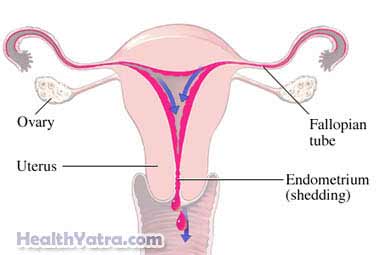تعريف
Premenstrual syndrome (PMS) is a disorder marked by physical and emotional symptoms. It affects women 1-2 weeks before the beginning of their menstrual period.

أسباب
While the exact cause is not known, PMS may be related to certain factors (eg, environmental, metabolic, or behavioral factors) that may make a woman more vulnerable to the hormonal changes that occur during menstruation.
عوامل الخطر
Factors that may increase the risk of PMS include:
- Age: 25-40
- Going off birth control pills
- Major life stress
- اكتئاب
الأعراض
قد تشمل الأعراض ما يلي:
- التهيج
- تقلب المزاج
- قلق
- اكتئاب
- Diminished self-esteem
- Difficulty concentrating
- Sleep problems
- Appetite changes (eg, sugar and/or salt cravings, overeating)
- زيادة الوزن
- تعب
- الانتفاخ
- الصداع
- Breast swelling and tenderness
- Palpitations
- الدوخة
- Gastrointestinal upset
- ألم عضلي
Symptoms usually improve when bleeding starts (menstrual period).
التشخيص
سوف يسألك طبيبك عن أعراضك وتاريخك الطبي. سيتم أيضًا إجراء فحص بدني.
You will be asked to keep a detailed record of your monthly physical and emotional symptoms. If caused by PMS, these symptoms will likely occur 1-2 weeks before your menstrual period. You may have PMS if symptoms occur at the same phase of the menstrual cycle each month.
العلاج
تشمل خيارات العلاج ما يلي:
ادارة الاجهاد
Stress may be managed through lifestyle changes. Relaxation techniques, deep breathing, massage, music, and hot baths can also help reduce stress.
التغييرات الغذائية
Dietary changes may be helpful. Your doctor may recommend that you decrease your intake of salt, sugar, and caffeine. Eating small, frequent meals may also help.
Vitamins and Minerals
The following vitamin and mineral supplements might reduce PMS symptoms:
- Vitamin E (400 IU) —may reduce breast tenderness
- Calcium (1,000 mg) —may decrease bloating, depression, and aches
- Magnesium (400 mg) —may decrease pain, fluid retention, and improve mood
- Manganese (6 mg) —may help control symptoms of menstrual pain
Talk to your doctor before you take any supplements.
Regular Exercise
Exercising throughout the week may help to reduce your symptoms.
الأدوية
Your doctor may recommend medicine, such as:
- Diuretics to reduce bloating and fluid retention.
- Pain reliever to relieve cramps, headaches, and muscle aches
- Birth control pills to reduce physical symptoms
- Selective serotonin reuptake inhibitors to reduce emotional symptoms
العلاج النفسي
Women with severe PMS symptoms (called premenstrual dysphoric disorder) may benefit from cognitive behavioral therapy. Therapy may reduce negative emotions and enhance problem-solving skills in relationships. It may also manage obstacles, frustrations, and discomfort.
الوقاية
To help reduce your chance of getting PMS, take the following steps:
- السيطرة على التوتر.
- Eat a healthy diet, one that is low in saturated fat and rich in whole grains and fruits and vegetables.
- Consume less refined sugar, salt, and caffeine.
- Do regular aerobic exercise.
